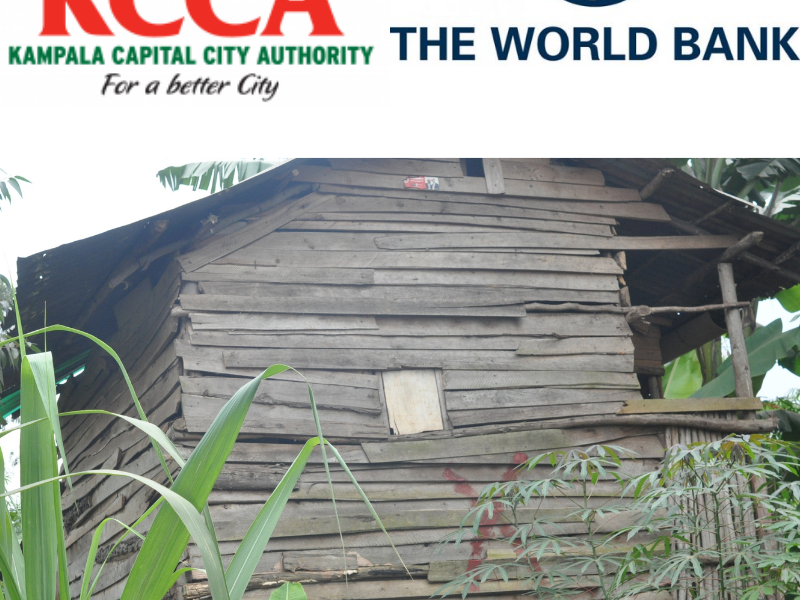DEFENDING LAND AND ENVIRONMENTAL RIGHTS
Double tragedy as KCCA uses the World Bank’s money to evict a Kawaala resident from both his home and place of work: TALES OF A BUSKER
Published
4 years agoon
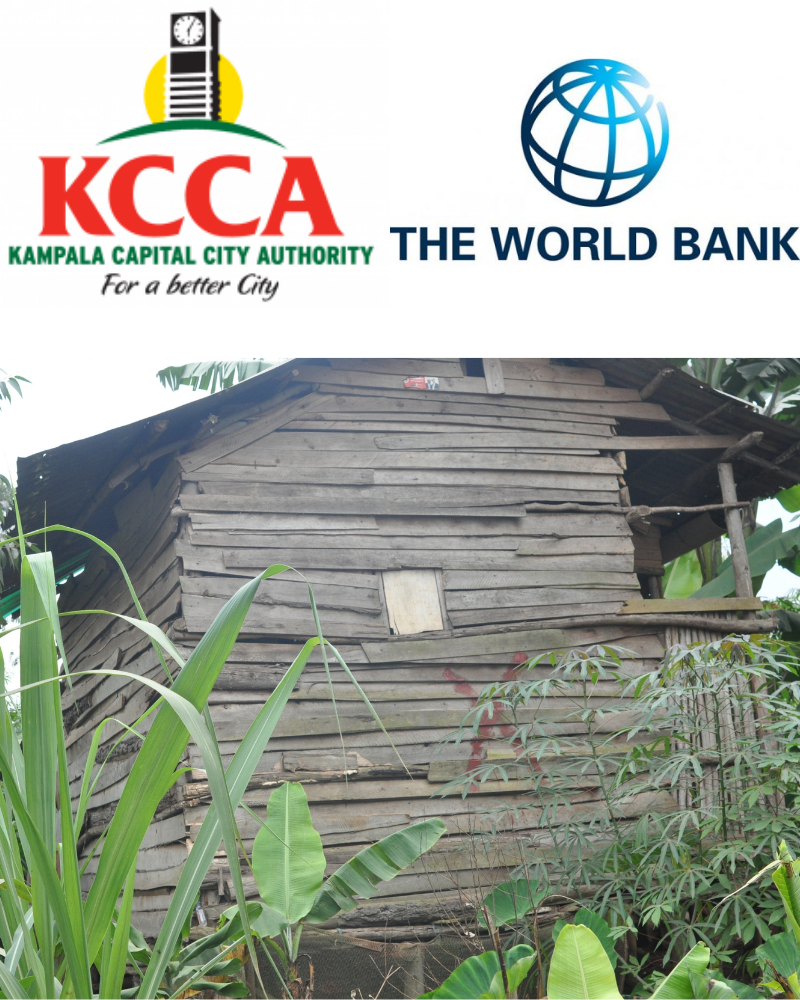
Mr. Mutaasi’s house marked with “X” by KCCA for demolition.
By witnessradio.org Team
“…Ekuba omunaku tekya…”, loosely translated as “The rain that falls on a down-and-out is a relentless deluge,” is one of the adages applied among the Baganda, and its equivalent among the English is, “it never rains but it pours”, highlight the 12 years of misery of 42-year-old Mutaasi Ali.
Mutaasi, a resident of Kawaala zone II in Kampala had a dream of living a better life, but it has never turned out as he had envisioned it. His suffering started way back from the fire-outbreak that twice gutted his merchandise in the Owino-Park Yard market. A market that mothered the urban poor. That Market is no more. It was replaced with a gigantic mall whose construction was preceded by a brutal night of forced eviction carried out with impunity by Kampala Capital City Authority (KCCA). The Authority is the governing body and administers the Capital City of Uganda.
Now the ghosts of the past are back, he hardly sleeps. A nightmare of a looming eviction to give way to the expansion and construction of Lubigi-Channel under a World-Bank funded project, KIIDP-1or 2, pre-occupies his mind. And the outbreak of the pandemic is another setback that has kept him on tenterhooks waiting for the Covid-19 relief from the government.
The father of ten (10), has spent about a half of his age on the streets of Kampala trying out different odd jobs to feed his family.
Before the pandemic, he was a maid of all work. He gurgled busking, farming, singing, and playing aback-up artist role. Mutaasi who is now a backup artist moved from his home village in Mpigi town in Mpigi district, 50 km from the western side of Uganda’s capital Kampala for greener pasture in the capital at the age of 18.
“I was born to in an extended poor family; we had little chances of getting the basic needs we wanted because of being poor. I had to look for a livelihood elsewhere to support my needs and those of my family,” Mutaasi narrated.
Mutasi said a village friend who had come earlier in Kampala informed him of a job. “A friend of mine in Kamwokya, a Kampala suburb helped me to get it. It was a hawking job. I did it for about 4 years on the streets of Kampala. In 1997, we shifted to the Park Yard market,” he added.
When he was moved to Park Yard market, it was a great achievement. “Because we were expanding, and our second hand-clothing business was showing signs of success, he (my boss) decided we move to Park Yard since it was busier and had enough space. And after making some little money, I parted ways with him (my boss) and I started a similar business in the same market in 2004,” he added.
He was determined to learn and worked hard. He becomes an inspiration not only to his peers but also to his former coworkers. “Mutaasi was a promising bright child that everyone wanted to be with. We looked up to him for inspiration,” a close friend confirmed in an interview with Witness Radio.
His business continued to boom, but misfortune struck. Mutaasi and many other traders suffered big blows when merchandise, worth billions of Ugandan shillings was razed in the fire that first gutted the market in 2009.
“I had shopped a day before the fire, so I was left with nothing and no capital to start again with,” he said.
But as the saying of the Banna Kampala (people living in Kampala) that “Kampala kuyiiya,” literally meaning that to thrive in Kampala you have to hustle. Mutaasi and two of his friends moved onto the city streets as buskers with a reggae music version.
“I would practice singing in my free time and some friends of mine had described my voice as euphonious. Because I had nothing to do at home at that time, we formed a group of three, went to the streets, and started entertaining people. Some of us were even employed as backup artists during shows,” Mutaasi reveals.
He says the little money they earned helped them to cater to their needs. “At least on a good day, we could earn 6000 Shillings (USD 1.7) each, which I would use to look after my family in the village. In about a year, I had also saved some money and went back to Park Yard market to give selling clothes a second-shot,” he shares with a nostalgic look.
According to Mutaasi, initially, his business had failed to pick up, but the desire for better life kept him soldiering on.
“I had to limit on other roles, so I left the street entertainment and concentrated much on growing my business in Park Yard and recording music. Every single coin I would get from music would be invested in my second-hand clothing business,” he added.
Whereas it had grown, fire gutted the market on 31st July 2011 and destroyed traders’ merchandise worth millions of shillings. It did not spare his business either. And according to Mutaasi, this was the second fire in one year and subsequent fire outbreaks until Park Yard Market land was forcefully grabbed by KCCA, politically connected investors, and police in 2017 without any prior consultation or compensation.
“When this happened, I felt like I had lost my senses. Asking myself why I don’t succeed yet others do, and why my businesses collapse yet others stand the taste of time,” he recounts.
In an interview with the Sunday Monitor, a local newspaper in March 2017, Mr. Kiggundu acknowledged being behind the eviction of Park Yard vendors. He said he demolished the temporary structures at Park Yard to make it a better place. Mutaasi was left grasping at straws
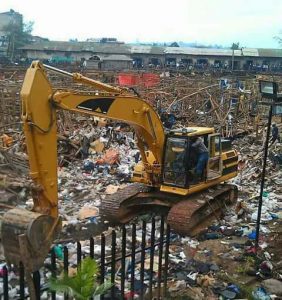
Helpless traders watch as their merchandise are destroyed by an excavator during an eviction in march 2017.
After a double loss, he had to pick up his broken pieces and focus on music and entertainment which had been his initial source of income, but the ghosts of the past continued to haunt him. In July 2020, a countrywide lock-down was imposed and the entertainment industry was hit hard. No concerts! No bars! No clubs! This was later lifted except for the entertainment industry.
Then when he thought the state would lift the ban on the music industry, there was a surge in COVID-19 cases, the government of Uganda imposed a second lockdown. This continued to pile misery upon him.
“Backing up other artists pays less and it is what I used to rely on now. We depend on God’s mercy to survive. I have not even received the government’s COVID relief ever since the lockdown started.” he added.
As he still recounts his ordeal; the misery in Park Yard market and the heart-wrecking lockdowns, the father of 10 is now facing forced eviction from his 27×40 piece of land by a World Bank-funded project. Mutaasi bought his piece of land 10 years ago from his hard-earned money.
In all that he has gone through his land without a doubt is being grabbed by Kampala Capital City Authority (KCCA) officials to pave way for the Lubigi primary channel expansion.
He said, “I started working in 1991. Look, my merchandise perished and the only thing I have is a piece of land that I have, and now is being taken away without any compensation.
“KCCA’s imminent eviction has taken me aback. I remember when I was evicted from a rental. I was verbally abused in front of my children, wife, and neighbors, my household items were thrown out and others confiscated. I was forced to move out of the house since the rent arrears had accumulated,” he shares the distressing memories. That day, he and the rest of the family had to brave the cold night outside. The following day, he could not bear the embarrassment and scorn that came with the eviction. He took it upon himself to construct a makeshift shelter, without walls, on his piece of land to temporarily serve as a house.
Good times may not last, but bad memories never fade, and Mutaasi, now penniless at the time, vividly remembers the price he had to pay to put up the make-shift shelter; “I had some sugarcane on the land, and on the second day, I requested my neighbors to give me eucalyptus poles to in exchange for the sugarcane. That is how I started a new life without a coin.”
He wonders why KCCA, the project implementer, is using the World Bank project to grab his land without being compensated. He is among the 120 households being evicted to pave away for the Lubigi drainage channel expansion project.
“You cannot tell me that you want my land on which you have found me living and you don’t want to compensate me for it. You want to take it and you don’t want to prepare for me who owns it. Why don’t they first prepare for the people affected by the project and then think of taking the land?” He questioned.
He also blames KCCA for the corrupt networks under the Buganda Land Board (BLB), a company that manages the Kabaka’s land who solicit money from them in rewards to a letter taken to KCCA to carry out the surveying and valuation of their property.
“We are required to clear UGX 250,000 (USD 70.46) for a letter proving your ownership in Mengo, the Busuulu (ground rent) of UGX 550,000 (USD 155), and UGX 150,000 (USD 42.28) to the chairman for the stamp. This is a lot of money that some of us don’t have. We are in a lockdown, and like me, I stopped working last year, where do they expect me to get all that money,” he further wondered.
He wonders what will happen if the others pay the BLB fee and is valued and surveyed but he fails to clear the fee. “It seems I am losing my land too, because if I lack what to eat, then where will I get the money to pay for the surveying and valuation,” he said.
He proposes that KCCA uses its money to survey and value his land, clear BLB, and then deduct it from the compensation money instead of losing the property they have worked for generations.
“I have suffered a lot and I feel I am tired…, he painfully concluded.
Related posts:

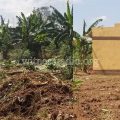 LOCKDOWN LAND EVICTIONS: KCCA is using the World Bank funding to grab my land…
LOCKDOWN LAND EVICTIONS: KCCA is using the World Bank funding to grab my land…
 Forced eviction during covid-19 lockdown: KCCA with the World Bank funding is excluding me and my siblings from being compensated for our properties because we evolved lawyers in the eviction process.
Forced eviction during covid-19 lockdown: KCCA with the World Bank funding is excluding me and my siblings from being compensated for our properties because we evolved lawyers in the eviction process.
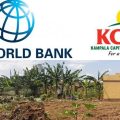 Witness Radio welcomes the World Bank’s intervention into Kawaala drainage channel project affected persons…
Witness Radio welcomes the World Bank’s intervention into Kawaala drainage channel project affected persons…
 Over 2000 Face Eviction From Kasubi Market As KCCA Implements A World Bank Funded Project
Over 2000 Face Eviction From Kasubi Market As KCCA Implements A World Bank Funded Project

You may like
DEFENDING LAND AND ENVIRONMENTAL RIGHTS
A land rights defender and his wife have been arrested, charged, and sent to prison.
Published
3 days agoon
July 16, 2025
By Witness Radio team.
Kiryandongo District – A community land rights Defender at Nyamutende Cell in Kiryandongo District, and his wife have been sent to prison by a magistrate’s court in Kiryandongo District, Witness Radio confirms.
Olupot James and his wife, Apio Sarah, were charged with malicious damage to property after a multinational company, Kiryandongo Sugar Limited, accused them of destroying its crops. The area police later picked them up.
Since 2017, Kiryandongo Sugar Limited, a subsidiary of Rai Holdings Private Limited, has been among the three multinationals that have forcibly displaced over thirty-five thousand (35,000) people in Kiryandongo District without following due diligence or offering alternative settlement options.
Community land Rights defender Olupot James and his wife Apio Sarah are amongst a few remaining families that resisted the company’s violent eviction and repression. Their home is currently trapped in the middle of the sugar plantation after they lost their land, which was dug up to the house by the multinational. Despite their peaceful resistance, Olupot has been arrested, charged, and imprisoned more than six times, a clear indication of the injustice they are facing.
Since late May this year, the duo has been reporting to Kiryandongo police station on Criminal Case Number CRB No. 316/2025, until they were arrested and aligned before the court and imprisoned. Olupot was remanded to Dyang while Apio is in Kiryandongo prison.
The state alleges that Olupot and Apio committed the offence of malicious damage to property in Kikungulu village, Kiryandongo District, a region with a complex history of land-related conflicts.
The Witness Radio’s legal aid team is monitoring the case and will appear in court to apply for their bail.
Related posts:

 Land rights defenders charged with criminal trespass, released on police bond.
Land rights defenders charged with criminal trespass, released on police bond.
 Court releases a tortured community land rights defender on bail
Court releases a tortured community land rights defender on bail
 Breaking! Land rights defender charged with setting fire to crops, released on bond
Breaking! Land rights defender charged with setting fire to crops, released on bond
 Breaking: A community land rights defender in the Kiryandongo district is charged with assault and released on a cash bail.
Breaking: A community land rights defender in the Kiryandongo district is charged with assault and released on a cash bail.
DEFENDING LAND AND ENVIRONMENTAL RIGHTS
Crackdown on EACOP protesters intensifies: 35 Activists arrested in just four months.
Published
3 months agoon
April 30, 2025
By Witness Radio team.
Ugandan authorities’ ongoing crackdown on anti-EACOP protest marches is spreading rapidly like wildfires. The East African Crude Oil Pipeline (EACOP) Project, a significant oil infrastructure development, has been a point of contention. Recently, Witness Radio warned that criminalizing the activities of individual activists and environmental defenders opposed to this project, which aims to transport crude oil from Hoima in Uganda to the Port of Tanga in Tanzania, will be regarded as the most disastrous and insensitive to communities’ concerns in Uganda’s history.
In just four months, a series of arrests targeting environmental activists opposing the mega oil project that transports crude oil from Hoima in Uganda to the Port of Tanga in Tanzania has resulted in a scene of crime. No one is allowed to express their concerns peacefully about it and push back on its adverse negative impacts.
While activists view the peaceful marches as a rightful and brave effort to protect the environment and the communities affected by the project, the authorities, including the Uganda police and Prosecutor’s office, regard these actions as attempts to sabotage development projects and resort to criminalization.
Activists and civil society organizations’ reports indicate that the project will likely damage the environment and has displaced thousands of local communities in Uganda and Tanzania.
Despite growing concerns and an intensified crackdown, project financiers and shareholders remain unwavering in supporting the EACOP project. This steadfast support underscores the urgency of the situation. However, environmental and human rights defenders stand firm, resolutely demanding the project’s halt, showing a glimmer of hope in this challenging situation.
Over last weekend, eleven (11) environmental activists were arrested, charged, and sent to prison. They were arrested and detained by police at Kenya Commercial Bank (KCB) premises while attempting to deliver a petition urging the bank to halt its financial support for the 1,444-kilometer heated pipeline project.
The arrest of the eleven activists comes less than a month after nine activists were detained on April 02 outside the Stanbic Bank headquarters while attempting to deliver a petition urging the bank to halt its funding for the project.
The eleven include Bob Barigye, Augustine Tukamashaba, Gilbert Ayebare, Umar Kasimbe, Joseph Ssengozi, Keith Namanya, Raymond Bituhanga, Mohammed Ssentongo, Paul Ssekate, Misach Saazi and Phionah Nalusiba.
KCB Bank Uganda is one of the banks that recently joined the race to fund the EACOP project. Last month, On March 26, 2025, EACOP Ltd., the company in charge of the construction and future operation of the EACOP project, announced that it had acquired additional financing provided by a syndicate of financial institutions, including regional banks such as KCB Bank.
Other banks in the syndicate include the Stanbic Bank Uganda, the African Export-Import Bank (Afreximbank), the Standard Bank of South Africa Limited, and the Islamic Corporation for the Development of the Private Sector (ICD).
The activists appeared before the Nakawa Chief Magistrate Court on April 25. They were charged with criminal trespass. According to section 302 of the Penal Code, a person convicted of criminal trespass is liable to a maximum sentence of one year in prison. This detail underscores the weight of the situation.
The activists are currently on remand at Luzira Maximum Prison and are expected to appear again before the court on May 08, 2025, for mention.
Related posts:

 The latest: Another group of anti-EACOP activists has been arrested for protesting Stanbic Bank’s financing of the EACOP Project.
The latest: Another group of anti-EACOP activists has been arrested for protesting Stanbic Bank’s financing of the EACOP Project.
 Another group of eleven environmental activists have been charged with common nuisance and remanded to Luzira Prison for opposing the EACOP project.
Another group of eleven environmental activists have been charged with common nuisance and remanded to Luzira Prison for opposing the EACOP project.
 Breaking: Eight (8) environmental activists have been arrested by police over protesting against the EACOP project.
Breaking: Eight (8) environmental activists have been arrested by police over protesting against the EACOP project.
 Breaking: 15 Anti-EACOP Activists Arrested in Kampala While Marching to Parliament
Breaking: 15 Anti-EACOP Activists Arrested in Kampala While Marching to Parliament
DEFENDING LAND AND ENVIRONMENTAL RIGHTS
Witness Radio Petitions ODPP urgently to review and withdraw criminal charges against Buvuma Community Land Defenders.
Published
3 months agoon
April 14, 2025
By Witness Radio team.
As Ugandan courts increasingly become tools of oppression, Witness Radio is deeply concerned about the growing trend of weaponizing the justice systems against communities, land, and environmental defenders who resist land grabbing and other harmful land-based investments.
In a well-calculated tactic, land grabbers and investors continue to collude with security agencies, particularly the police, to arrest violently and courts of law to maliciously prosecute hundreds of these defenders for either fighting back against the land-grabbing schemes or criticizing harmful land-based investments in Uganda.
This trend of persecution is not isolated to Buvuma but is a continuous threat in many other parts of Uganda. Buvuma, in particular, is a hotbed of injustice, where the government of Uganda, in collaboration with BIDCO, is implementing the National Oil Palm Project (NOPP) to expand palm oil growing in Uganda.
In our article dated March 5th this year, Witness Radio revealed how community land defenders in Buvuma continued to face judicial harassment on trumped charges simply for defending their land from being grabbed for palm oil plantations.
The accused defenders are residents of the Magyo and Bukula villages in the Buvuma district.
More than a dozen smallholder farmers in these villages situated in Nairambi Sub-county are facing violent evictions from their land and unending persecution. They have been framed with criminal charges for refusing to give away their land for palm oil growing.
The victims are legal owners of bibanja duly registered by Buganda Land Board and recognized as tenants by Buganda Land Board.
Buvuma College school is claiming ownership of the land, while Buvuma district officials, under the guise of protecting Kirigye Forest Reserve, also claim the same land on which these individuals have settled lawfully for decades.
Several community members have been arrested and charged with false criminal offenses.
Among them include community land rights defender Ssentongo, who is currently battling with cases CRB:301/2023, accused of illegally occupying Kirigye forest land (offense of carrying out prohibited activities in forest reserve).
CRB 232/2024 with complainant Kabale Denis (District Forest Officer) charged with carrying out prohibited activities in the forest reserve and CRB 098/2023 on criminal trespass with Buvuma College administration, the complainant.
Others facing persecution are Steven Kyeswa, Kisekwa Richard, and Kibondwe Chrysostom on CRB 141/2024 with assault occasioning actual bodily harm vide Criminal Case No 075 of 2024, among other cases.
As part of efforts to end the ongoing oppression of community defenders in Buvuma, Witness Radio has petitioned the Office of the Director of Public Prosecutions to urgently intervene, review, and withdraw the charges unjustly brought against these defenders.
According to the petition dated March 7th, 2025, the sole intention of these charges is to grab community land without any merits as criminal charges. Sarah Adong, one of the staff attorneys and Head of Witness Radio Legal Aid, reveals that the matters against the accused persons before the court point to the question of land ownership, which can only be answered through civil suits and not criminal charges. It is an apparent injustice.
“Upon thoroughly examining the facts, evidence, and circumstances surrounding these charges, it is evident that they have no merit whatsoever. They amount to vexatious and frivolous prosecution that serves no genuine interest of justice,” the petition by the Land and Environmental Rights Watchdog mentioned.
In an unusual turn of events, the Witness Radio Legal Aid team observed that some of the defenders, including Sentongo, have been charged with criminal trespass twice by the same complainant vide CC No 325 of 2020 and are now facing the same charge by the same party vide CC No 062/2023. This repeated persecution is a heavy burden on these defenders.
“The charges against our client undermine the accused person’s rights under Article 29 (9) of the Constitution of the Republic of Uganda. It has proven that the cases brought against our clients are frivolous and vexatious as they are instituted in a manner that constitutes abuse of court processes,” the petition further read.
Therefore, the organization strongly urges the office of the DPP to exercise its prosecutorial discretion under relevant legal provisions. This is crucial for the prevalence of equity, justice, and good conscience and reaffirming the prosecution process’s integrity and objectivity.
Related posts:

 Witness Radio petitions chief prosecutor: Want 34 community land rights defenders and activists released from prison.
Witness Radio petitions chief prosecutor: Want 34 community land rights defenders and activists released from prison.
 Palm Oil project investor in Landgrab: Witness Radio petitions Buganda Land Board to save its tenants from being forcefully displaced palm oil plantation.
Palm Oil project investor in Landgrab: Witness Radio petitions Buganda Land Board to save its tenants from being forcefully displaced palm oil plantation.
 Court charges and remands two community land rights defenders and eight farmers to prison
Court charges and remands two community land rights defenders and eight farmers to prison
 Uganda: Targeting community land and environmental defenders with criminal offenses is rising as two community land rights defenders arrested in a hotspot district of forced land evictions.
Uganda: Targeting community land and environmental defenders with criminal offenses is rising as two community land rights defenders arrested in a hotspot district of forced land evictions.

A land rights defender and his wife have been arrested, charged, and sent to prison.

Land Grabbing Crisis Escalates in Uganda: Mayiga Urges Citizens to Secure Land Documents

Seizing the Jubilee moment: Cancel the debt to unlock Africa’s clean energy future

Activism on Trial: Despite the increasing repressive measures, Uganda’s EACOP protesters are achieving unexpected victories in the country’s justice systems.

A decade of displacement: How Uganda’s Oil refinery victims are dying before realizing justice as EACOP secures financial backing to further significant environmental harm.

Activism on Trial: Despite the increasing repressive measures, Uganda’s EACOP protesters are achieving unexpected victories in the country’s justice systems.

Govt launches Central Account for Busuulu to protect tenants from evictions

Communities Under Siege: New Report Reveals World Bank Failures in Safeguard Compliance and Human Rights Oversight in Tanzania

Innovative Finance from Canada projects positive impact on local communities.
Over 5000 Indigenous Communities evicted in Kiryandongo District
Petition To Land Inquiry Commission Over Human Rights In Kiryandongo District
Invisible victims of Uganda Land Grabs
Resource Center
- LAND GRABS AT GUNPOINT REPORT IN KIRYANDONGO DISTRICT
- RESEARCH BRIEF -TOURISM POTENTIAL OF GREATER MASAKA -MARCH 2025
- The Mouila Declaration of the Informal Alliance against the Expansion of Industrial Monocultures
- FORCED LAND EVICTIONS IN UGANDA TRENDS RIGHTS OF DEFENDERS IMPACT AND CALL FOR ACTION
- 12 KEY DEMANDS FROM CSOS TO WORLD LEADERS AT THE OPENING OF COP16 IN SAUDI ARABIA
- PRESENDIANTIAL DIRECTIVE BANNING ALL LAND EVICTIONS IN UGANDA
- FROM LAND GRABBERS TO CARBON COWBOYS A NEW SCRAMBLE FOR COMMUNITY LANDS TAKES OFF
- African Faith Leaders Demand Reparations From The Gates Foundation.
Legal Framework
READ BY CATEGORY
Newsletter
Trending
-

 SPECIAL REPORTS AND PROJECTS2 weeks ago
SPECIAL REPORTS AND PROJECTS2 weeks agoActivism on Trial: Despite the increasing repressive measures, Uganda’s EACOP protesters are achieving unexpected victories in the country’s justice systems.
-

 DEFENDING LAND AND ENVIRONMENTAL RIGHTS3 days ago
DEFENDING LAND AND ENVIRONMENTAL RIGHTS3 days agoA land rights defender and his wife have been arrested, charged, and sent to prison.
-

 SPECIAL REPORTS AND PROJECTS7 days ago
SPECIAL REPORTS AND PROJECTS7 days agoSeizing the Jubilee moment: Cancel the debt to unlock Africa’s clean energy future
-

 MEDIA FOR CHANGE NETWORK7 days ago
MEDIA FOR CHANGE NETWORK7 days agoLand Grabbing Crisis Escalates in Uganda: Mayiga Urges Citizens to Secure Land Documents

